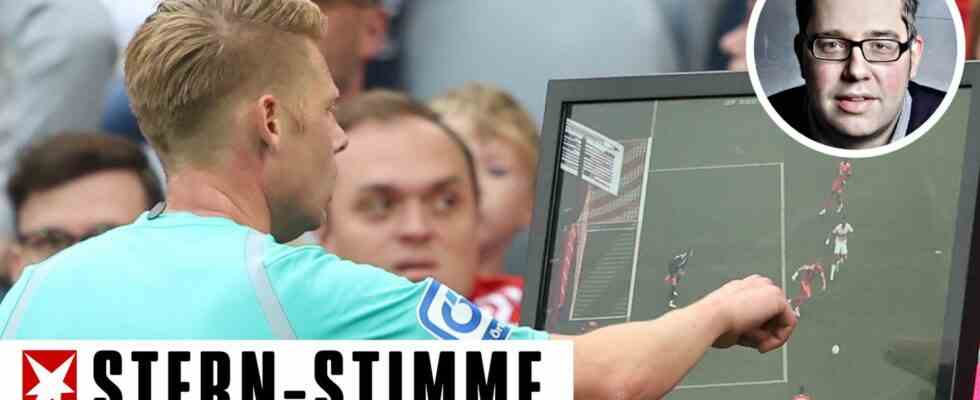P. Köster: cabin sermon
Abolish or radically remake: The video evidence is at the end
More annoyance than help: The video evidence can under no circumstances remain so, says star– Voice of Philip Köster. He demands: Abolish or radically reform.
© Alexander Hassenstein / Getty Images
The video evidence should bring justice to football. Instead, he deprives the fans in the stadium of goal celebrations, weakens the referees on the field and causes endless arguments. It should be abolished or radically reformed, says star-Voice Philip Koester.
Luca Kilian, central defender at Bundesliga club 1.FC Köln, is a physical wonder. He is the only creature with eyes on the back of his head, which enabled him to fend off an approaching header from Berlin striker Robin Knoche in the Bundesliga match against 1.FC Union. Sounds absurd? Well, referee Benjamin Cortus must have assumed this anomaly in order to decide on a penalty kick based on the two criteria “deliberate handball” or “unnatural enlargement of the body area”. And that’s not all: The colleagues from the Cologne basement also approved of Kilian’s visionary abilities. It stayed with the penalty.
It was just one of numerous controversial to bizarre decisions that were made at the weekend in the interplay between referees and Cologne basement. Werder Bremen got a penalty in all seriousness because Marvin Ducksch had hit his Augsburg opponent Maximilian Bauer with the ball from a short distance in the upper arm. And in the game at Hertha BSC, Leverkusen threw themselves Odilon Kossounou two meters from the goal line in a shot that the swinging right arm blocked. A deliberate handball and a clear penalty kick, which referee Bejnjamin Brand denied with almost amusing stubbornness even after the game, despite clear television images.
Cologne coach Steffen Baumgart recognizes “cheating”
These three disputed handballs were disputed with astonishing vehemence after the games. On the one hand in the stadiums, where Cologne coach Steffen Baumgart, for example, wanted to have recognized a “mess”, as well as on the Internet, where the emotions sometimes spilled over so much that the referee explainers of the “Collinas Erben” deactivated their Twitter account without further ado.
A measure that was generally seen and regretted as a protest against the rude tone on social media – and rightly so. But it can also be observed that the video-supported referee whistle is regularly commented on in a particularly aggressive manner, far more than anything else that happens on and off the pitch.
Video evidence in this form has gambled away all credit
What also makes it clear: the video evidence in its current form has gambled away any credit: once introduced to make football fairer and more transparent, today it appears as an arbitrary and favoritism instrument. The idea of checking based on incorruptible television pictures and the sober view of experts is now considered amateurishly conceived and amateurishly implemented.
Now it was clear from the start that the video evidence would damage some key stadium experiences. This applies in particular to the moment of celebrating together after goals have been scored. It is now a sad reality that there is nowhere near as much cheering in the stadiums as before the introduction of video evidence. Instead of shouting out his joy and hugging the man next to him, the fan glances at the referee, whether he is listening intently into his headset or is already painting the notorious box in the air.
Comprehensive justice remains a pipe dream
However, this loss of great feelings should be compensated for by a new and comprehensive justice. Grotesque mistakes, whether in handball, offside positions or physical assaults, should be a thing of the past. But the belief in the technology and in being able to accompany the games quickly and competently from a Cologne basement turned out to be hubris.
Instead, everything was missing from the start. Be it based on clear criteria as to when the supervisors even speak up. Be it mature technology, to be able to credibly justify centimeter decisions in offside positions. Be it speed, so as not to turn every second decision into an endless game of patience for the spectators in the stadium. Be it the ability to criticize obvious misjudgments. And be it due to successful public relations, which the referees’ guild considered superfluous and promoted numerous resentments and prejudices.
Only radical solutions help
The list of deficiencies is even longer and makes it clear: the video evidence must not remain as it is now and only radical solutions will help. Either the league is bold and decides to do away with video surveillance with the exception of goal-line technology. However, that would also mean that the supporters would have to come to terms with one or the other wrong decision. Or the league opts for a fundamental reform, with a significantly higher threshold for intervention, with mandatory public relations and transparency, with high investments, for example to promote automatic offside detection and a significant strengthening of the referee, who can no longer be the vicarious agent of the video assistants.
In any case, things can’t go on like this. No video control is required to determine this.

